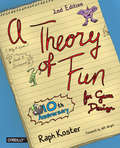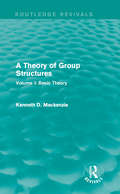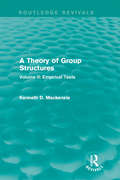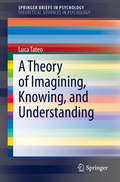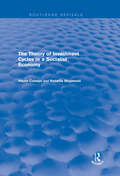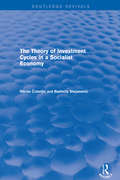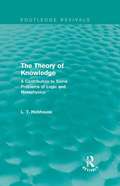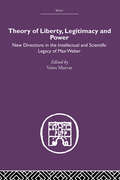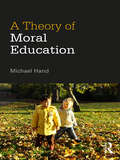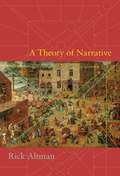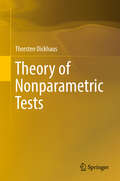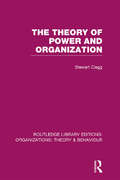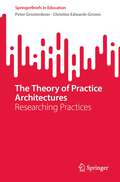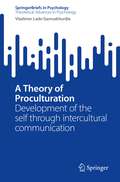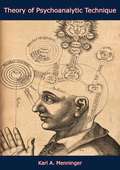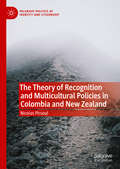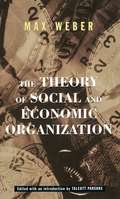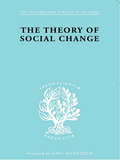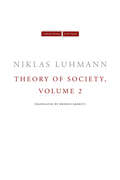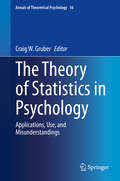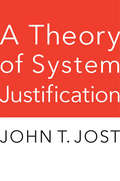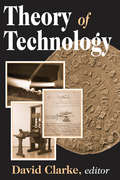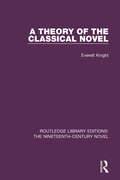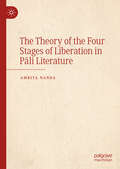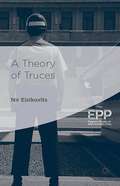- Table View
- List View
Theory of Fun for Game Design
by Raph KosterNow in full color, the 10th anniversary edition of this classic book takes you deep into the influences that underlie modern video games, and examines the elements they share with traditional games such as checkers. At the heart of his exploration, veteran game designer Raph Koster takes a close look at the concept of fun and why it’s the most vital element in any game.Why do some games become boring quickly, while others remain fun for years? How do games serve as fundamental and powerful learning tools? Whether you’re a game developer, dedicated gamer, or curious observer, this illustrated, fully updated edition helps you understand what drives this major cultural force, and inspires you to take it further.You’ll discover that:Games play into our innate ability to seek patterns and solve puzzlesMost successful games are built upon the same elementsSlightly more females than males now play gamesMany games still teach primitive survival skillsFictional dressing for modern games is more developed than the conceptual elementsTruly creative designers seldom use other games for inspirationGames are beginning to evolve beyond their prehistoric origins
A Theory of Group Structures: Volume I: Basic Theory
by Kenneth D. MackenzieFirst published in 1976, this A Theory of Group Structures is a study of the aggregation of individuals into groups, which cuts across many different social sciences. Volume one attempts to formulate a more rigorous theory of group structures by providing consistent definitions, assumptions, measures, methodology, theory and results. This book will be of interest to students of all social sciences.
A Theory of Group Structures: Volume II: Empirical Tests
by Kenneth D. MackenzieFirst published in 1976, this A Theory of Group Structures is a study of the aggregation of individuals into groups, which cuts across many different social sciences. Volume two examines a sequence of twelve experiments and reports empirical tests of the theory presented in volume one. The result is a major revision of existing research into problems of group structure and a case study in paradigm development. This book will be of interest to students of all social sciences.
A Theory of Imagining, Knowing, and Understanding (SpringerBriefs in Psychology)
by Luca TateoThis is a book about imaginative work and its relationship with the construction of knowledge. It is fully acknowledged by epistemologists that imagination is not something opposed to rationality; it is not mere fantasy opposed to intellect. In philosophy and cognitive sciences, imagination is generally “delimiting not much more than the mental ability to interact cognitively with things that are not now present via the senses.” (Stuart, 2017, p. 11) For centuries, scholars and poets have wondered where this capability could come from, whether it is inspired by divinity or it is a peculiar feature of human mind (Tateo, 2017b). The omnipresence of imaginative work in both every day and highly specialized human activities requires a profoundly radical understanding of this phenomenon. We need to work imaginatively in order to achieve knowledge, thus imagination must be something more than a mere flight of fantasy. Considering different stories in the field of scientific endeavor, I will try to propose the idea that the imaginative process is fundamental higher mental function that concurs in our experiencing, knowing and understanding the world we are part of. This book is thus about a theoretical idea of imagining as constant part of the complex whole we call the human psyche. It is a story of human beings striving not only for knowledge and exploration but also striving for imagining possibilities.
The Theory of Investment Cycles in a Socialist Economy
by Nikola CobeljicThis title was first published in 1968. Economic development and the system of the functioning of socialist economies have become the subject matter of an increasing number of works by economists throughout the world. Indeed, the experiences of socialist countries on different levels of social and economic development already offer a good deal of empirical material for theoretical analysis. An attempt at such an analysis has been made in this book, where the authors have concentrated on the investigation of a specific phenomenon in the motion of the economy — so-called investment cycles.
The Theory of Investment Cycles in a Socialist Economy
by Radmila Stojanovic Nikola CobeljicThis title was first published in 1968. Economic development and the system of the functioning of socialist economies have become the subject matter of an increasing number of works by economists throughout the world. Indeed, the experiences of socialist countries on different levels of social and economic development already offer a good deal of empirical material for theoretical analysis. An attempt at such an analysis has been made in this book, where the authors have concentrated on the investigation of a specific phenomenon in the motion of the economy — so-called investment cycles.
The Theory of Knowledge: A Contribution to Some Problems of Logic and Metaphysics (Routledge Revivals)
by L. T. HobhouseL. T. Hobhouse (1864-1929) was fundamental to the New Liberal movement of the late nineteenth and early twentieth century. He authored many important works in the fields of philosophy, economics and social liberalism. First published in 1896, The Theory of Knowledge considers the content and validity of knowledge, and the conditions on which our understanding of knowledge is based. It is a rich and important classic, which remains of value to students and academics with an interest in sociology, anthropology and the philosophy of logic.
Theory of Liberty, Legitimacy and Power: New Directions In The Intellectual And Scientific Legacy Of Max Weber (International Library Of Sociology Ser.)
by Vatro MurvarThe stature of Max Weber (1864-1920) as an interdisciplinary, historical-comparative social scientist has grown steadily. But in view of Professor Murvar, his work has been misinterpreted with remarkable frequency. The aim of this book is to put right certain misconceptions and misinterpretations of Max Weber's intellectual and scientific legacy. This book challenges assumptions about various aspects of Weber's work; the issues of modernization, evolutionary theories, world systems, growth of liberty, typologies of power structures and legitimacies, among others. As well as presenting precise criticism and appreciation of the way Weber's work has been handled by his successors, this book also details the specific advancement he himself made within the theory of liberty, legitimacy and power. There is special emphasis on how much Weber's work in these core areas has survived the test of time. This book was first published in 1985.
A Theory of Moral Education
by Michael HandChildren must be taught morality. They must be taught to recognise the authority of moral standards and to understand what makes them authoritative. But there’s a problem: the content and justification of morality are matters of reasonable disagreement among reasonable people. This makes it hard to see how educators can secure children’s commitment to moral standards without indoctrinating them. In A Theory of Moral Education, Michael Hand tackles this problem head on. He sets out to show that moral education can and should be fully rational. It is true that many moral standards and justificatory theories are controversial, and educators have an obligation to teach these nondirectively, with the aim of enabling children to form their own considered views. But reasonable moral disagreement does not go all the way down: some basic moral standards are robustly justified, and these should be taught directively, with the aim of bringing children to recognise and understand their authority. This is an original and important contribution to the philosophy of moral education, which lays a new theoretical foundation for the urgent practical task of teaching right from wrong.
A Theory of Narrative
by Rick AltmanNarrative is a powerful element of human culture, storing and sharing the cherished parts of our personal memories and giving structure to our laws, entertainment, and history. We experience narrative in words, pictures, and film, yet regardless of how the tale is told, story remains independent from the media that makes it concrete. Narrative follows humans wherever they travel and adapts readily to new forms of communication. Constantly evolving and always up-to-date, narrative is a necessary strategy of human expression and a fundamental component of human identity.In order to understand human interaction, award-winning scholar Rick Altman launches a close study of narrative's nature, its variation in different contexts, and the method through which it makes meaning. Altman's approach breaks away from traditional forms of analysis, identifying three basic strategies: single-focus, dual-focus, and multiple-focus. Unpacking an intentionally diverse selection of texts, Altman demonstrates how these strategies function in context and illustrates their theoretical and practical applications in terms of textual analysis, literary and film history, social organization, religion, and politics. He employs inventive terminology and precise analytical methods throughout his groundbreaking work, making this volume ideal for teaching literary and film theory and for exploring the anatomy of narrative on a more general level.
Theory of Nonparametric Tests
by Thorsten DickhausThis textbook provides a self-contained presentation of the main concepts and methods of nonparametric statistical testing, with a particular focus on the theoretical foundations of goodness-of-fit tests, rank tests, resampling tests, and projection tests. The substitution principle is employed as a unified approach to the nonparametric test problems discussed. In addition to mathematical theory, it also includes numerous examples and computer implementations. The book is intended for advanced undergraduate, graduate, and postdoc students as well as young researchers. Readers should be familiar with the basic concepts of mathematical statistics typically covered in introductory statistics courses.
The Theory of Power and Organization (Routledge Library Editions: Organizations)
by Stewart CleggIn this book the author develops a theory of power and organization, derived from a critical consideration of a literature extending across sociology, political science, philosophy and organization theory. The book raises and answers some of the issues which are important in the construction of a theoretical apparatus for the analysis of power and at the same time it proposes an alternative concept of organization, centred around the themes of power and control.
The Theory of Practice Architectures: Researching Practices (SpringerBriefs in Education)
by Peter Grootenboer Christine Edwards-GrovesThis book provides an overview of the Theory of Practice Architectures (TPA), and the associated Theory of Ecology of Practices, in a manner accessible for a broader audience. The authors are part of the authorial team that developed the Theory of Practice Architectures from a strong empirical base, with its initial publication in 'Changing Practices, Changing Education' (Kemmis et al., Springer, 2014). This book follows on from that publication with a singluar focus on the Theory of Practice Architectures, and shows how it can be used as a theoretical framework for a range of empirical research projects. It first outlines and describes both the Theory of Practice Architectures and the Theory of Ecology of Practices, illustrating them with a range of relevant practical examples. Then, it focuses explicitly on designing and undertaking empirical research, analyzing data and reporting findings using the Theory of Practice Architectures. In this way, this book shows specifically and overtly explicate ways that research can be designed, and how data can be collected and analyzed, drawing on the Theory of Practice Architectures as a foundational framework. It also showcases a range of specific examples to allow readers to see the ideas as they have been employed in practice.
A Theory of Proculturation: Development of the self through intercultural communication (SpringerBriefs in Psychology)
by Vladimer Lado GamsakhurdiaIn each connection with new cultural contexts a new hybrid state of cultural adaptation is constructed enabling people to adjust to new conditions by creating innovative solutions for the self. This book aims to provide a brief presentation of innovative cultural psychological theory of proculturation reflecting and oriented on the understanding of semiotic and developmental dynamics of higher mental phenomena while engaging alien signs through intercultural communication. The exploration and theoretical understanding of developmental dynamics (such as self and identity construction) of people who live in immigration or multicultural, or even multi-ethnic societies, the research builds its new focus in contrasts with the acculturation theories currently present in social psychology. The theory of proculturation has been built in opposition to cross-cultural psychological theories as well as mainstream theories of acculturation research dominated by bidimensional theoretical models. Instead, this theory is constructed based on theoretical explorations which are rooted in cultural semiotics and developmental psychological paradigm on human psychology.
Theory of Psychoanalytic Technique
by Karl A. MenningerThis book examines the essential dynamics of the interpersonal situation involved in a two-party contract or—to use the word preferred by Dr. Maxwell Gitelson—compact. The author applies these dynamic principles to the psychoanalytic treatment situation, pointing out the pressures and values which can be mobilized to favor communication by the patient to the listening therapist and the extent to which these are followed by gratifications and frustrations which alter the balance in such a way as to determine a progressive course. If the reader will note the topics of the chapters listed he will observe that the reactions of both patient and therapist to each other in the interactive process or compact are carried systematically and successively to a point where separation of the contractees is logical. This over-all view will permit us to examine such familiar phenomena as transference, regression, resistance, interpretation, and so on in a perspective which gives them a clearer meaning. It will be objected that this sharpness or clarity involves certain distortions or misrepresentations, dependent upon oversimplification. But this is the perennial dilemma of the teacher: the teaching of facts and figures versus the teaching of truth.—Print ed.
The Theory of Recognition and Multicultural Policies in Colombia and New Zealand (Palgrave Politics of Identity and Citizenship Series)
by Nicolas PirsoulThis book analyses the policies of recognition that were developed and implemented to improve the autonomy and socio-economic well-being of Māori in New Zealand and of indigenous and Afro-descendent people in Colombia. It offers a theoretically informed explanation of the reasons why these policies have not yielded the expected results, and offers solutions to mitigate the shortcomings of policies of recognition in both countries. This in-depth analysis enables readers to develop their understanding of the theory of recognition and how it can promote social justice.
The Theory Of Social And Economic Organization
by Max WeberThis book is an introduction to Max Weber&’s ambitious comparative study of the sociological and institutional foundations of the modern economic and social order.In this work originally published in German in 1920, Weber discusses the analytical methods of sociology and, at the same time, presents a devastating critique of prevailing sociological theory and of its universalist, determinist underpinnings. None of Weber&’s other writings offers the reader such a grasp of his theories; none displays so clearly his erudition, the scope of his interests, and his analytical powers.
The Theory of Social Change (International Library of Sociology)
by John McLeishFirst Published in 1998. Routledge is an imprint of Taylor & Francis, an informa company.
Theory of Society, Volume 2
by Niklas Luhmann translated by Rhodes BarrettThis second volume of Niklas Luhmanns two-part final work was first published in German in 1997. The culmination of his thirty-year theoretical project to reconceptualize sociology, it offers a comprehensive description of modern society. Beginning with an account of the fluidity of meaning and the accordingly high improbability of successful communication, Luhmann analyzes a range of communicative media, including language, writing, the printing press, and electronic media, as well as "success media," such as money, power, truth, and love, all of which structure this fluidity and make communication possible. The book asks what gives rise to functionally differentiated social systems, how they evolve, and how social movements, organizations, and patterns of interaction emerge. The advent of the computer and its networks, which triggered potentially far-reaching processes of restructuring, receives particular attention. A concluding chapter on the semantics of modern societys self-description bids farewell to the outdated theoretical approaches of "old Europe"--that is, to ontological, holistic, ethical, and critical interpretations of society--and argues that concepts such as "the nation," "the subject," and "postmodernity" are vastly overrated. In their stead, "society"--long considered a suspicious term by sociologists, one open to all kinds of reification--is defined in purely operational terms. It is the always uncertain answer to the question of what comes next in all areas of communication.
The Theory of Statistics in Psychology: Applications, Use, and Misunderstandings (Annals of Theoretical Psychology #16)
by Craig W. GruberThis edition of Annals of Theoretical Psychology focuses on the utilization of statistics and the empirical nature of them as applied to psychology in action. Beginning with statements from the American Statistical Association on the applicability of statistics, the volume moves to a discussion of empiricism in psychology, and the reliance on statistics. The book then branches out to discuss applied aspects of statistics in Emergency management, policing, and technology. In these areas, a tie-in to the relevance of the person in the statistical measures is a prominent aspect for discussion. Finally, the book looks at applicability and use of statistics as descriptors of larger, societal samples as opposed to use for describing individual behavior. This edition is designed to continue the exploration of theoretical psychology as it applies to behavior and the individual, as the last edition, Leader Development Deconstructed, did with examining leaders and leadership."Leaders influence others. Their tools include competence, candor and character. In those first two areas I’ve found statisticians possess a strong foundation for leadership (critical thinking, problem solving, strategic perspective, and risk management) but often lack a comfortable, collaborative temperament which inhibits their maximum effect. In this issue of Annals, Dr. Craig Gruber (a Navy Reserve Intelligence Officer to boot!) combines all three elements of influence which proves why he is regarded as a thought leader in this field. His inclusion in this edition of outstanding works from many subject matter experts’ offers an inclusive and comprehensive approach to understanding the power, impact, and decision advantage of statistics and leadership when effectively paired. Enjoy!"- Rear Admiral Paul Becker, USN (retired), President of The Becker T3 Group, and former Director of Intelligence for the Joint Chiefs of Staff
A Theory of System Justification
by John T. JostA leading psychologist explains why nearly all of us—including many of those who are persecuted and powerless—so often defend the social systems that cause misery and injustice. Why do we so often defend the very social systems that are responsible for injustice and exploitation? In A Theory of System Justification, John Jost argues that we are motivated to defend the status quo because doing so serves fundamental psychological needs for certainty, security, and social acceptance. We want to feel good not only about ourselves and the groups to which we belong, but also about the overarching social structure in which we live, even when it hurts others and ourselves. Jost lays out the wide range of evidence for his groundbreaking theory and examines its implications for our communities and our democracy. Drawing on twenty-five years of research, he provides an accessible account of system justification theory and its insights. System justification helps to explain deep contradictions, including the feeling among some women that they don’t deserve the same salaries as men and the tendency of some poor people to vote for policies that increase economic inequality. The theory illuminates the most pressing social and political issues of our time—why has it been so hard to combat anthropogenic climate change?—as well as some of the most intimate—why do some black children prefer white dolls to black ones and why do some people stay in bad relationships? Jost’s theory has far-reaching implications, and he offers numerous insights that political activists and social justice advocates can use to promote change.
Theory of Technology
by David ClarkeThe history of technology is often troubled by good ideas that do not, for one reason or another, take off right away--sometimes for millennia. Sometimes, technology comes to a standstill, and sometimes, it even reverses itself. Thus, unlike science, which seems to proceed at a reasonable and calm rate, the progress of technology is difficult to theorize about. While in science many developments are predictable to a certain extent and this predictability may, at times, direct or stymie science's progress--as with stem-cell research and cloning--technological advances, such as the Internet, are often sudden and unpredictable, and therefore frightening.In Theory of Technology, David Clarke brings together nine authors who try to understand technology from a variety of viewpoints. Rias van Wyk, in "Technology," parses the concept into many angles, including its anatomy, taxonomy, and evolution. Karol Pelc, in "Knowledge Mapping," discusses tracking the evolution of the emerging discipline of technology management. Jon Beard, in "Management of Technology," pursues a similar mapping endeavor, but looks to the patterns of the literature of technology management. Thomas Clarke, in "Unique Features of an R&D Work Environment and Research Scientists and Engineers," takes the reader on a tour of how people of technology present unique challenges to not just management but whole organizations.Richard Howey, in "Understanding Software Technology," places enterprise software into a meaningful pattern of technology management. Fred Foldvary and Daniel Klein, in "The Half-Life of Policy Rationales," discuss how new technology affects old policy issues. John Cogan, in "Some Philosophical Thoughts on the Nature of Technology," maintains that our Aristotelian search for the essence of technology is doomed. And Peter Bond, in "The Biology of Technology," establishes a basis for the development of a socio-biological approach to understanding the pheno
A Theory of the Classical Novel (Routledge Library Editions: The Nineteenth-Century Novel #23)
by Everett KnightFirst published in 1969, this book asserts that two concepts, structure and praxis, make it impractical for scholars to ignore the necessity of a theory of the novel — with the term ‘classical novel’ used to cover western fiction. The author argues that the novel is fundamentally an ‘enterprise’ — an aspect of the praxis of a particular social class — and that the ways of orthodox scholarship are also a praxis. The investigator must enquire into the nature of their questions as those traditionally put to literature are inspired by ‘irrelevant’ nineteenth century positivism. In the author’s view the book is necessarily a theory of the classical novel and a manifesto for the student movement.
The Theory of the Four Stages of Liberation in Pāli Literature
by Amrita NandaThis book investigates the origins and development of the theory of four stages of liberation in Pāli literature. This theory is an important soteriological cartography in early Buddhism, particularly Theravāda Buddhism. Amrita Nanda challenges the traditional interpretation of the four stages by recognizing the impact of the changing socio-religious factors on the theory’s origins and subsequent development. Based primarily on the Pali literary sources, this study utilizes sometimes-overlooked aspects of these texts. This book first traces the origins of each stage individually; then, it traces the formation of the theory and its subsequent development.
A Theory of Truces (Palgrave Studies In Ethics And Public Policy)
by Nir EisikovitsA Theory of Truces.
